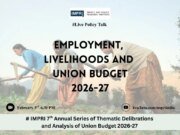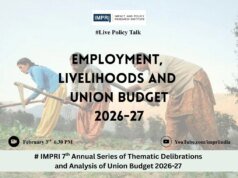Policy Update
Ananya Sitoke
Background
The Department of Biotechnology (DBT) under the Ministry of Science & Technology, Government of India, launched a new grant opportunity in 2020-21 called the M K BHAN – Young Researcher Fellowship Programme (MKB-YRFP). This program aims to encourage talented young researchers to continue their work in India after completing their Ph.D.
The fellowship provides independent research grants to post-doctoral fellows under the age of 35 for three years, which can be extended by an additional two years. The initiative is designed to help these researchers become future leaders in their fields and to support cutting-edge research focused on issues of national importance.
Functioning
This young research fellowship honours Dr. MK Bhan, who consistently encouraged and mentored emerging leaders in the field of science. He is renowned for developing the rotavirus vaccine and for serving as the former secretary of the Department of Biotechnology (DBT). Dr. Bhan transformed India’s biotechnology program and established several institutions that foster collaboration between industry and academia. Despite having numerous opportunities for prestigious international positions, his dedication to India remained exceptional. His primary goal was to enhance the research and implementation capacity of the country.
To commemorate his contributions, this fellowship was established to reflect his life and ideals by:
- Providing attractive opportunities for young researchers to develop into independent investigators.
- Enabling young researchers to pursue their research interests within the country while fostering a critical mass of trained scientists for India’s research institutions, universities, and major new initiatives.
The fellowship offers a consolidated monthly remuneration of ₹90,000, along with a research-contingency grant of ₹20 lakh per year. This grant can be used for hiring personnel, purchasing consumables, acquiring minor equipment, domestic travel, and other expenses related to the implementation of the selected research proposal. A national-level selection committee, established by the Department of Biotechnology, is responsible for selecting the final candidates for the MKB-YRFP. This fellowship is awarded for research work to be carried out exclusively at DBT Autonomous Institutes.
Performance & Impact
Each year, up to 50 fellowships are awarded under this program, covering a range of scientific fields. Candidates are affiliated with various host institutions, including THSTI, NIPGR, RCB, and ICGEB. Each candidate’s proposal addresses significant scientific questions and aims to advance their specific areas of research, including plant epigenetics, cancer research, and molecular biology. This focus ensures that the research outcomes will have a direct and meaningful impact on public health and national development.
A key objective of the program is to encourage bright young researchers to remain in India and continue their work, preventing the outflow of scientific talent. By offering a supportive environment and the opportunity to lead independent projects, the MKB-YRFP acts as a retention mechanism for top-tier scientific talent.
Emerging Issues
The MK Bhan Fellowship is essential for nurturing India’s future researchers. However, significant challenges hinder the fellowship’s effectiveness and impact.
- The scheme highlights the significance of DBT institutes, as the application process is managed by these host institutes. However, this can lead to delays and may discourage potential candidates.
- Relying on the host institute can create challenges if sufficient resources or support are not available.
- The stipend for the MKBhan fellowship is processed through the host institute, which may result in financial delays for the fellows.
- Currently, the scheme offers 50 fellowships per year; the first round saw around 358 applicants, resulting in a selection rate of only 15%, indicating a potential need for more fellowships.
- There is a lack of data available on total patents filed and the success rates of previous fellows after completing the fellowship.
Way Forward
The MKB-YRFP fellowship is a generous financial support that cultivates a new generation of scientific leaders committed to addressing challenges of national relevance. By taking these suggestions into account, the fellowship can be more effective in its implementation.
- The fellowship could consider extending eligibility beyond just DBT-Autonomous Institutes to other government-funded research institutions and universities with strong research infrastructure and mentorship. This would broaden opportunities and allow fellows to choose institutions best suited for their research area.
- The fellowship-awarding body should directly transfer the monthly stipend to the fellow’s bank account, eliminating the host institute as a middleman. This would reduce administrative delays.
- The number of fellowships offered each year can be increased. This would allow the program to support a greater number of talented researchers who are committed to working in India.
- A dedicated online portal or database to track the career paths of all former fellows can be developed by the Ministry. This system should collect information on their current employment status, research outputs, awards, and other achievements.
As India deepens its commitment to innovation and equity in research, fellowships like this serve as vital instruments for systemic transformation.
References
- India Bioscience. (n.d.). M K Bhan – Young Researcher Fellowship Programme. M K Bhan – Young Researcher Fellowship Programme – IndiaBioscience
- MK Bhan-Young Researcher Fellowship (MKB-YRF) Programme. (n.d.). Department of Biotechnology. Retrieved July 10, 2025, from MK Bhan-Young Researcher Fellowship (MKB-YRF) Programme | Department of Biotechnology
- Vikaspedia. (n.d.). M K Bhan Young Researcher Fellowship Programme. M K Bhan Young Researcher Fellowship Programme | Schemes
About the Contributor: Ananya Sitoke is a research intern at IMPRI and an undergraduate student of political science honours at the Lady Shri Ram College for Women, University of Delhi.
Acknowledgement: The author sincerely thanks Ms Aasthaba Jadeja and the IMPRI fellows for their valuable contributions.
Disclaimer: All views expressed in the article belong solely to the author and not necessarily to the organisation.
Read More at IMPRI:
Boost to University Interdisciplinary Life Science Departments: DBT-BUILDER



















